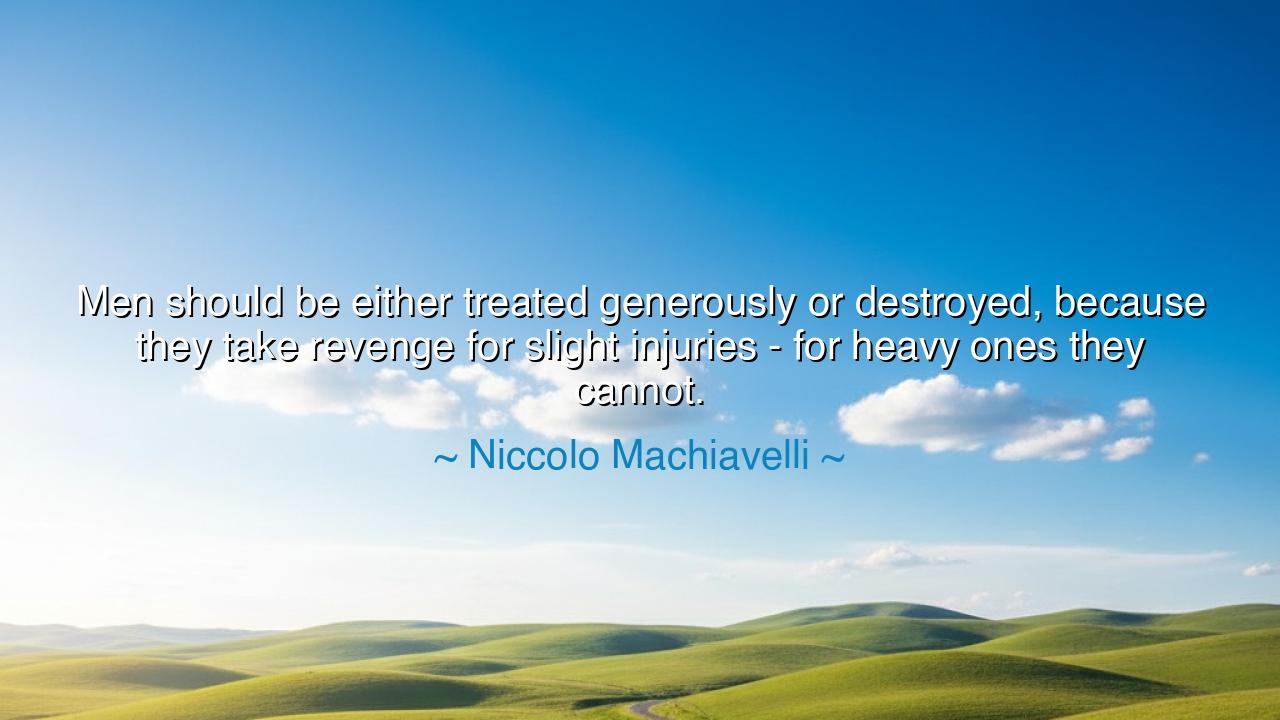
Men should be either treated generously or destroyed, because
Men should be either treated generously or destroyed, because they take revenge for slight injuries - for heavy ones they cannot.






In the labyrinth of human nature, there are certain truths that are often shrouded in complexity, yet they remain ever-present, guiding the actions of kings, warriors, and philosophers alike. Niccolò Machiavelli, in his wisdom, offers a piercing observation about the nature of men and their reactions to injury: "Men should be either treated generously or destroyed, because they take revenge for slight injuries – for heavy ones they cannot." This striking statement encapsulates a powerful understanding of human psychology and power dynamics—one that has echoed through the ages, from the rise and fall of ancient empires to the struggles of modern rulers.
In the ancient world, revenge was often seen as a natural and inevitable response to an injury. The great warrior kings of old understood that the fury of a slight injury could escalate into a fierce and dangerous force. Achilles, the hero of the Iliad, embodies this idea: his rage was sparked by the slight against his honor, when Agamemnon took his prize, Briseis. The slight against his pride was enough to turn the tide of the war, as he withdrew his forces, allowing the Greeks to suffer. Yet, the anger of a man wronged is a power that cannot be underestimated. Achilles, in the end, sought revenge for his perceived insult, though it did not heal the deeper wounds of war or honor—it only furthered the destruction of both sides.
Machiavelli’s insight points to the vulnerability of men in the face of slight injuries—the pride and ego that, when wounded, can lead to destructive acts of vengeance. But his words also suggest a nuance in the human heart: men, when faced with heavy injuries, often find themselves powerless. Machiavelli reveals that when a man is deeply harmed, when his spirit is broken or his strength is overwhelmed, the desire for revenge fades into a silent, resigned despair. It is a paradox of the human condition—that in the face of great harm, there is often nothing left to fight for, and thus, the instinct to retaliate dissipates. This is a truth that can be seen in many of the great stories of old, where heroes, once struck down by fate or betrayal, often fall into a melancholy acceptance, unable to seek revenge because their capacity for it has been drained.
Take, for instance, the tragic story of Julius Caesar. Though he was a master of political strategy and military conquest, his closest confidants, driven by jealousy and fear, delivered the fatal blow that would change the course of history. Brutus, a man once loyal to Caesar, was among the conspirators. Caesar, upon seeing Brutus among those who betrayed him, uttered the words, "Et tu, Brute?"—a sorrowful acceptance of the fact that the injury done to him by those he trusted was too great for any revenge to mend. In that moment, Caesar’s heart was not filled with anger, but with a deep, tragic understanding that the weight of such betrayal left him unable to fight. The injury was too heavy, and the desire for revenge, instead of fueling him, crushed him under its weight.
Thus, Machiavelli’s observation is not merely a commentary on individual behavior but also a political statement on how rulers must approach the delicate balance of power and justice. If a ruler, or anyone in a position of authority, slights those beneath them, they may ignite a fire of revenge that can lead to disaster. A slight injury—an offense that bruises the ego or reputation—may be repaid with swift vengeance, leading to a cascade of consequences. However, when the injury is too great, when the damage done is irreparable, the desire for revenge is often suffocated by despair, and the retribution that could have been sought is no longer possible. Machiavelli urges us to understand that it is not just the injury that matters but the context of the injury—the circumstances that dictate whether vengeance will be sought or whether it will be swallowed by the depths of loss.
The lesson that we must draw from Machiavelli’s words is that power—whether in relationships, governance, or personal dealings—must be wielded with great care and awareness. One must be careful not to diminish the worth of others with insignificant slights, for even the smallest wounds to pride can ignite a fire of anger that may be uncontrollable. But when faced with heavy losses, we must remember that some injuries cannot be avenged, and resilience becomes the true measure of strength. To be wise is to know when to offer generosity and when to recognize that, in the face of great injury, there may be no return—no path back to the peace that was once enjoyed.
Therefore, let us walk through the world not in reckless pursuit of power, but with an understanding of the weight our actions can carry. Let us treat others with the dignity and respect they deserve, knowing that even the smallest offense can lead to devastating consequences. Let us also understand that the most profound moments of strength often come when we are called to endure great hardship without the possibility of revenge. In such moments, we find the true measure of a man, not in his ability to strike back, but in his ability to rise above the wounds and continue forward with honor and integrity.






AAdministratorAdministrator
Welcome, honored guests. Please leave a comment, we will respond soon